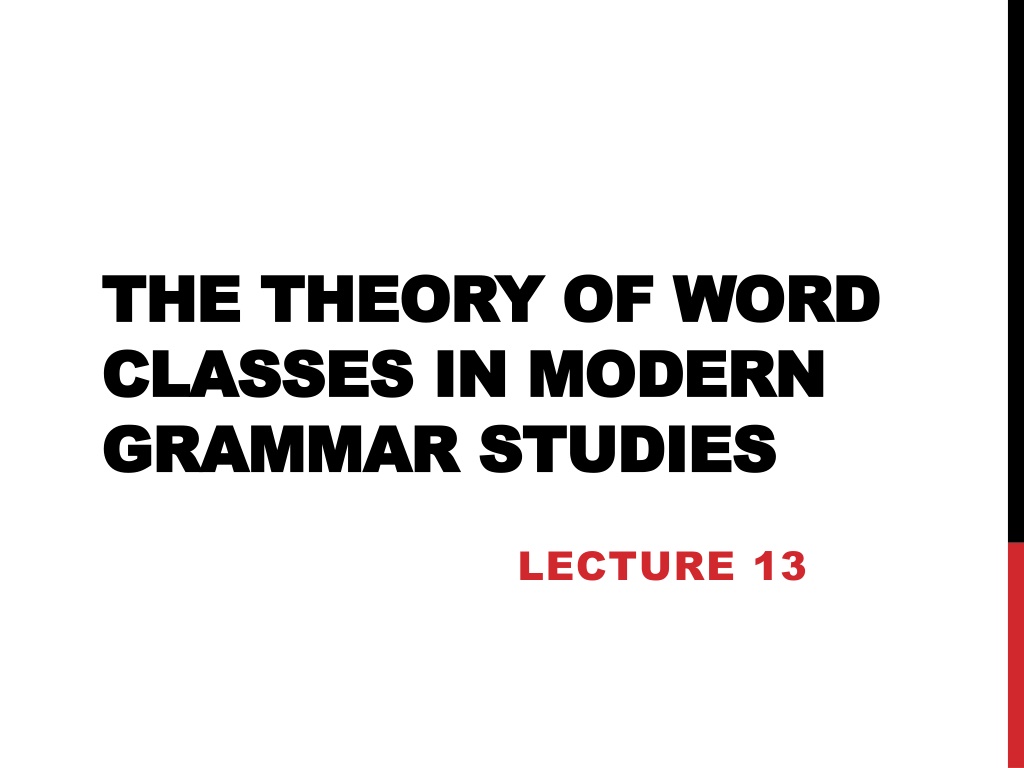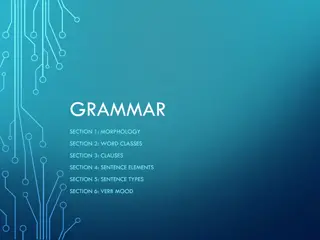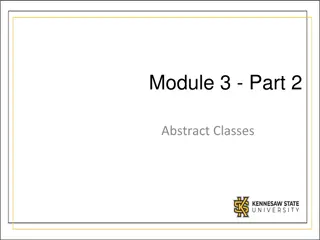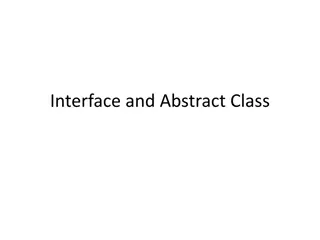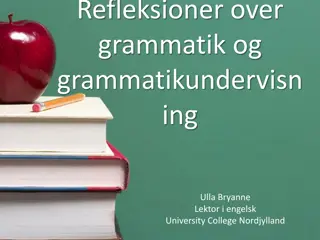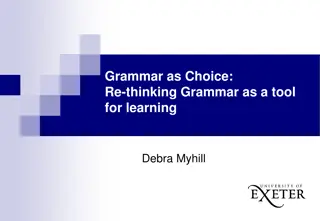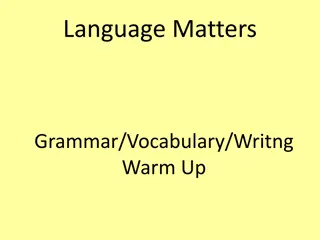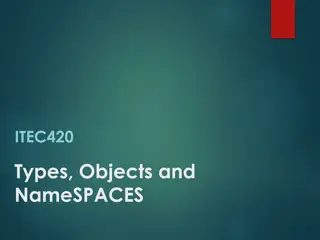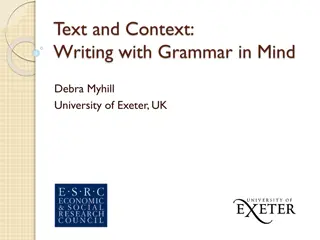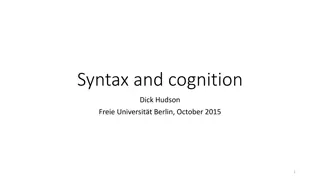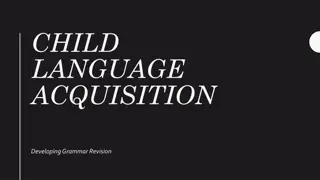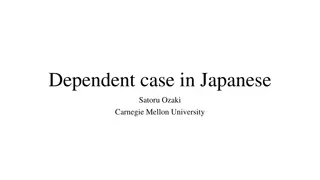Understanding the Theory of Word Classes in Modern Grammar Studies
Delve into the theory of word classes in modern grammar studies, exploring the distinctions between notional and functional words, the categorization of English nouns, and the significance of countable and uncountable nouns. Gain insights into the criteria used to classify parts of speech based on form, meaning, and function, and discover the role of nouns in expressing predication within sentences.
Download Presentation

Please find below an Image/Link to download the presentation.
The content on the website is provided AS IS for your information and personal use only. It may not be sold, licensed, or shared on other websites without obtaining consent from the author. Download presentation by click this link. If you encounter any issues during the download, it is possible that the publisher has removed the file from their server.
E N D
Presentation Transcript
THE THEORY OF WORD THE THEORY OF WORD CLASSES IN MODERN CLASSES IN MODERN GRAMMAR STUDIES GRAMMAR STUDIES LECTURE 13
13.1. The theory of grammatical classes of words. 13.2. The English Noun and its categories.
Ancient India: nouns, verbs, prepositions and particles. The principle: the meaning could be saved outside the sentence or lost. Ancient Greek: noun, verb, conjunctions (articles, pronouns, links). Alexandrian grammars: noun, verb, participle, article, adverb, pronoun, preposition, conjunction . Henry Sweet three main criteria: form, meaning and function. Parts of speech into two main groups: declinable and indeclinable. Therefore, three basic criteria: meaning, morphological features and syntactic function in the sentence.
There are two groups of word classes: notional and functional words. The first group comprises the words that have their full nominative value: nouns, verbs, adjectives, adverbs. They have their own full lexical meaning The second group includes the words of various syntactic functions: prepositions, conjunctions, particles, auxiliary and link verbs. The functional words serve to point at relations between the words or to specify grammar meaning of nominal parts of speech. Functional words cannot form a sentence. Their function is to connect the notional words within the sentence.
THE ENGLISH NOUN & CATEGORIES The noun is one of the main parts of speech. In combination with the verb it participates in expressing a predication, the center of the sentence. Noun can be distinguished by some formal characteristics with its substance or thingness as categorical meaning. Noun possesses the categories of case, number, gender and determination. It has specific word-building affixes (-tion, -ment, - sion, -ance/ence, ure, etc.). Nouns can perform various syntactic functions.
THE ENGLISH NOUN & CATEGORIES The category of number: countable and uncountable nouns. Countables are the nouns that denote a countable referent (table). regular and irregular plural forms. Uncountables are treated as the nouns denoting an uncountable referent (water, glass, love). Uncountables are the nouns that possess only one form (singular or plural). The words that can have only singular form are called Singularia Tantum, Nouns of only plural form can be named Pluralia Tantum.
THE ENGLISH NOUN & CATEGORIES The Singularia Tantum nouns can be the following: abstract nouns (luck, love) material nouns (water, coffee) names of sciences (mathematics, physics) collective nouns denoting groups of inanimate objects (furniture). The Pluralia Tantum nouns can be the following: nouns denoting objects consisting of two halves (scissors) nouns expressing indefinite plurality (cattle, clothes) nouns denoting some diseases (measles, mumps).
THE ENGLISH NOUN & CATEGORIES The category of case. Case may be defined as the function of the noun in the utterance or the sentence and its relations to other words in the phrase or sentence. Firstly, a theory of positional cases where syntactic position, or function is identified with case. The noun distinguishes the inflectional genitive case and four non- inflectional, positional cases (Nom.,Voc., Dat., Accus.) Secondly, theory of prepositional cases, where prepositional constructions are treated as analytic cases. The weak point of this theory lies in the unlimited number of cases as there are numerous prepositions in the English language. Thirdly, there are no cases in English.
THE ENGLISH NOUN & CATEGORIES Forthly, a two-case theory: there are only two cases in the English noun: nominative and genitive, or possessive. Only animate nouns are mostly used in genitive case, while inanimate ones rarely take the form of the genitive case. A noun in the genitive case can perform the only function attributive. S can be added not only to a noun but to a whole phrase, e.g., Son and Father s company. Phonetically, without semantic environment the noun in the genitive case is impossible to be distinguished from the plural form of the noun in pronunciation.
THE ENGLISH NOUN & CATEGORIES The category of gender. The category of gender in English is expressed by the obligatory correlation of nouns with the personal pronouns of the third person. Nouns that can express both feminine and masculine person genders are nouns of the common gender (board, staff, police). English nouns are capable of showing sex of their referents lexically, e.g. boy-friend, girl-friend; mister mistress. Some words of non-person animate beings reveal their belonging to the neuter gender via correlation with it (lion, lioness). The category of gender is appropriate only for animate nouns, while most inanimate nouns don t have gender description. There are three ways of expressing sex in English: lexical (a girl), morphological (a mistress), and syntactical (a girlfriend).
THE ENGLISH NOUN & CATEGORIES Article determination. The purpose of the determiners (articles, in particular) is to clarify the nounal referent in a more or less general way. The definite article has the meaning of identification or individualization of the referent expressed by the noun. The article indicates that the phenomenon or an object is taken in its particular, individualized property. The indefinite article is treated as referring the phenomenon expressed by the noun to a certain class of similar objects, conveying a classifying generalization of the referent given by the noun or shows it in a more general way. The meaningful absence of articles before the countable noun in the singular signifies that the noun is taken in an abstract sense, expressing the most general idea of the object denoted, e.g., Law (in general) begins with the beginning of human society.
THE ENGLISH NOUN & CATEGORIES The absence of the article before the uncountable noun corresponds to the two kinds of generalisation: both relative and absolute, Cf.: Coffee or tea, please? Vs Coffee stimulates the function of the heart. The absence of the article before the countable noun in the plural corresponds to both kinds of generalisation, Stars, planets and comets are different celestial bodies. Vs Wars should be eliminated as means of deciding international disputes .
